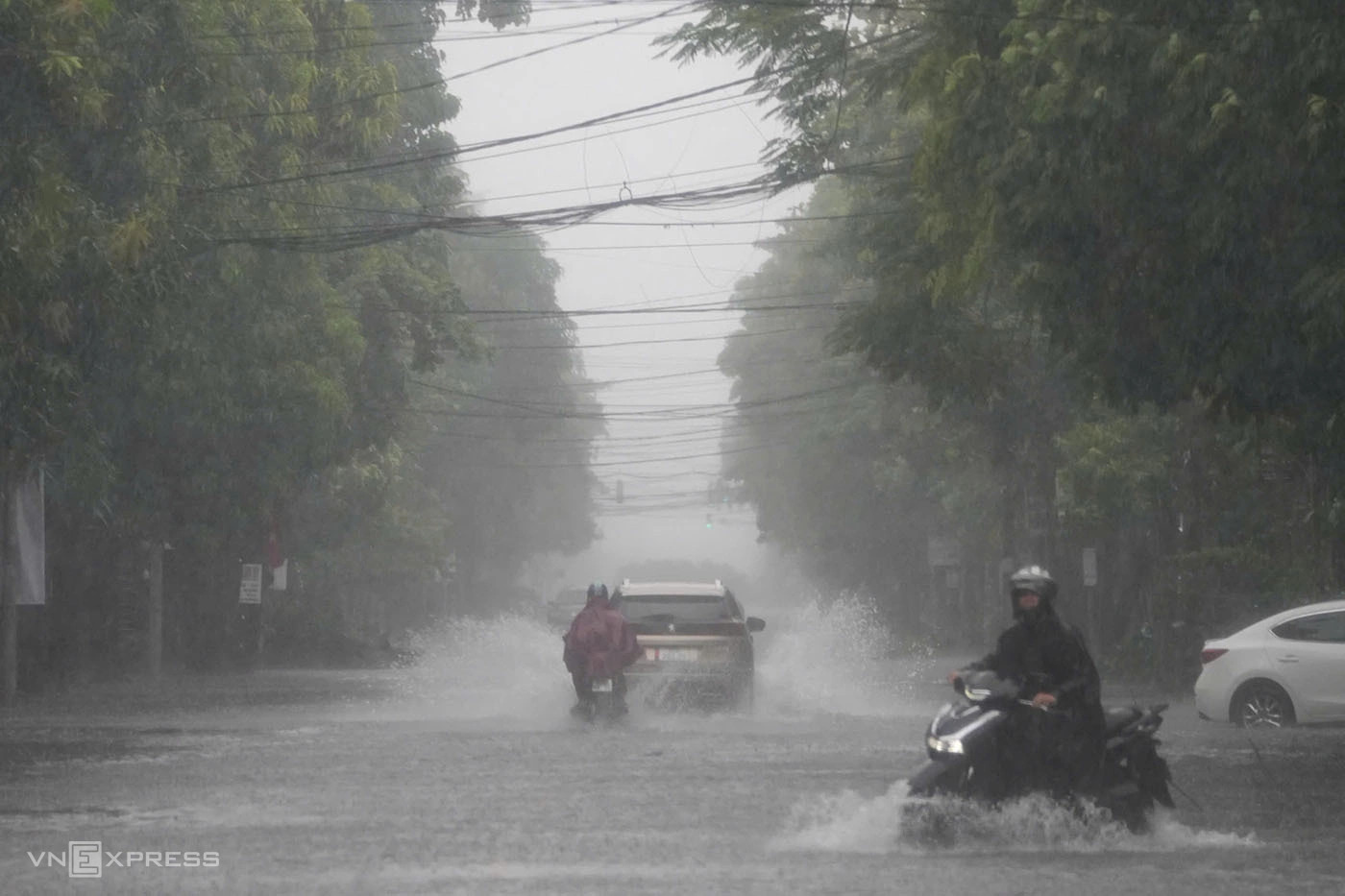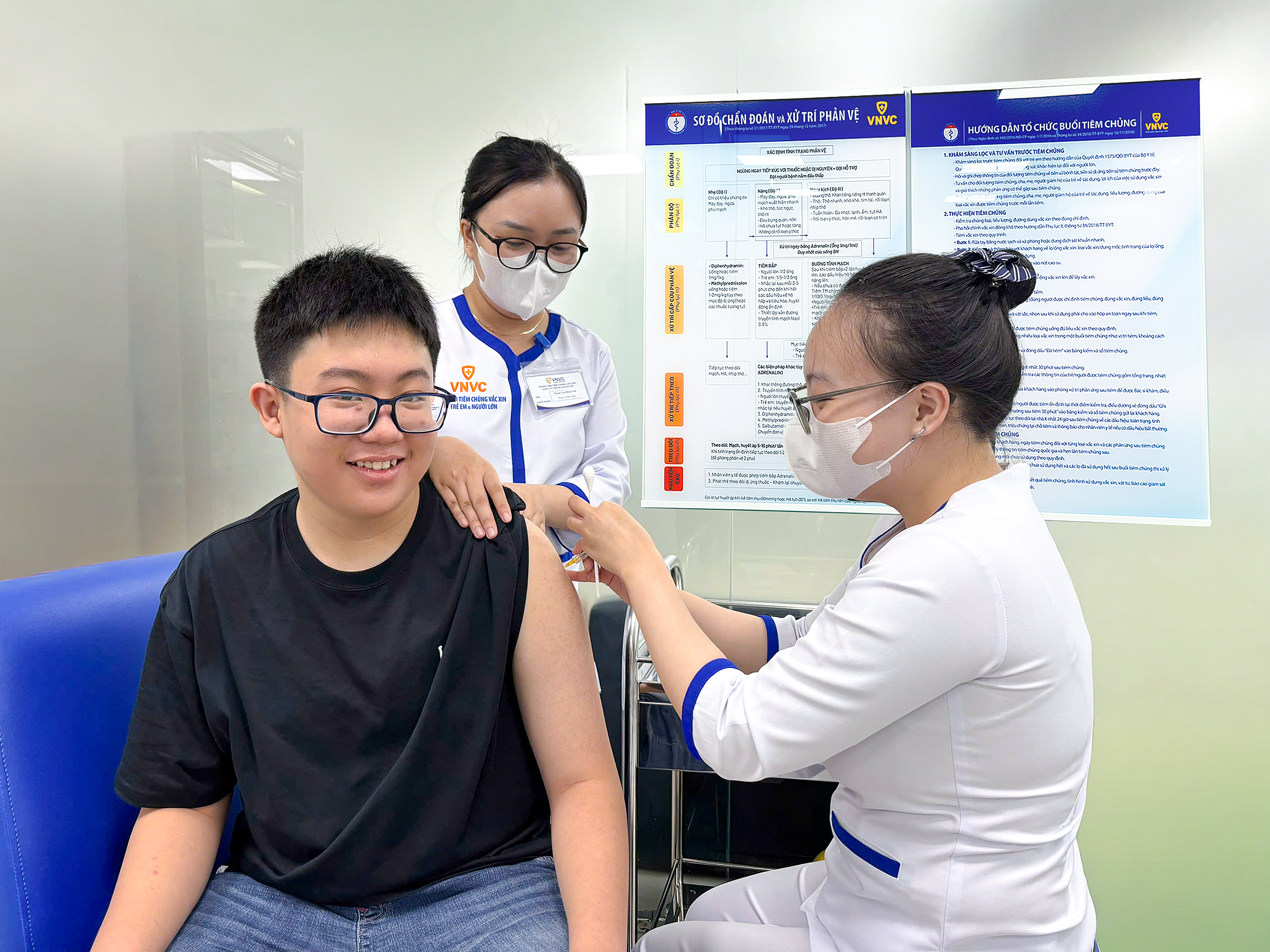Doctor Bui Thanh Phong, Medical Manager of the VNVC Vaccination System, issued this warning as Typhoon Kajiki made landfall in the region from Thanh Hoa to Quang Tri. He explained that humid weather, floods, and limited sanitation create favorable conditions for the spread of respiratory and digestive diseases, as well as the proliferation of disease-carrying mosquitoes. Additionally, people are more prone to injuries while seeking shelter or cleaning up after storms, increasing their risk of illness. Doctor Phong outlined the transmission routes of diseases that pose increased risks during storm season and offered advice on mitigation and prevention.
 |
Flooding and difficult travel in Thanh Vinh ward, Nghe An province, on 25/8. Photo: Dong Hung |
Flooding and difficult travel in Thanh Vinh ward, Nghe An province, on 25/8. Photo: Dong Hung
Food and waterborne diseases
Storms often bring heavy rain, flooding crops, homes, roads, bridges, and causing waste and dead animals to float in the water. This contaminates drinking water and produce. Consuming undercooked food exposes people to pathogens like cholera, typhoid, E. coli, shigella, hepatitis A, and rotavirus.
Cholera and rotavirus can cause severe diarrhea, vomiting, dehydration, electrolyte imbalances, and potentially lead to heart failure and death. Typhoid causes systemic infection with symptoms like fatigue and sudden high fever. Without prompt treatment, it can lead to complications such as pneumonia, myocarditis, encephalitis, intestinal perforation, and death. Hepatitis A, besides causing diarrhea, can also lead to acute liver failure, pancreatitis, and cholecystitis.
Insect bites and disease vectors
According to the Ministry of Health, storms and floods create ideal breeding grounds for disease vectors like flies and mosquitoes. Flies can transmit cholera, typhoid, parasitic worms, and pink eye when they land on food, drinks, or a person's eyes or mouth.
Mosquitoes transmit diseases like dengue fever, Japanese encephalitis, malaria, yellow fever, Zika, and Chikungunya. Dengue fever can become severe between the 4th and 7th days after the fever subsides, with unpredictable complications like blood thickening leading to shock, multiple organ failure, and uncontrollable bleeding.
Skin contact and open wounds
Floodwaters harbor bacteria such as tetanus, leptospira, staphylococcus aureus, and the flesh-eating bacteria Burkholderia pseudomallei and Vibrio vulnificus. These bacteria can enter the body through open wounds. Wading in floodwaters, cleaning up debris, and participating in rescue efforts expose people to injuries and these pathogens.
Tetanus causes full-body muscle stiffness, difficulty swallowing and breathing, convulsions, respiratory failure, cardiac arrest, multiple organ failure, and has a mortality rate of up to 90%. During Typhoon Yagi in 2024, the National Hospital of Tropical Diseases treated a 52-year-old man from Thai Binh with severe tetanus from a wound caused by a brick falling on his leg while he was building flood defenses.
Wading in contaminated water and mud, without access to clean water for hygiene, also increases the risk of skin diseases like fungal infections, scabies, and skin infections. In early June, the Central Dermatology Hospital reported numerous cases of infectious skin inflammation, including a 35-year-old man who experienced severe bleeding and discharge from his legs after wading in floodwater.
Respiratory transmission
Exposure to floodwaters, consistently damp clothing, and lack of warmth weaken the body's immune system, increasing susceptibility to coughs, fevers, and respiratory infections caused by viruses like rhinovirus, RSV, and influenza. Living and interacting with others in damp conditions also facilitates the rapid spread of these pathogens.
Influenza can lead to pneumonia, meningitis, and sepsis. Individuals with weakened immune systems, such as young children, pregnant women, the elderly, and those with underlying health conditions, are at higher risk of severe complications from influenza. Pneumococcal and meningococcal bacteria, typically harmless in the nasal passages, can become invasive and cause pneumonia, meningitis, and sepsis when mucous membranes are damaged or the immune system is weakened.
 |
People receiving vaccinations at the VNVC Vaccination System. Photo: Nhat Linh |
People receiving vaccinations at the VNVC Vaccination System. Photo: Nhat Linh
Disease prevention
Storms and floods can disrupt normal living conditions. Maintaining good health requires adherence to basic hygiene principles, such as consuming cooked food and boiled water, and ensuring food safety. People should wash their hands frequently with soap before meals and after using the toilet, properly dispose of human waste and other refuse, and handle dead animals with care.
Avoid wading in contaminated water. If contact is unavoidable, wash and dry your hands and feet thoroughly. Clean water containers regularly, and sleep under mosquito nets, even during the day, to prevent mosquito bites.
Vaccines are available for many of the mentioned diseases, including influenza, cholera, typhoid, hepatitis A, pneumococcal disease, meningococcal disease, tetanus, and dengue fever. For influenza, children aged 6 months to under 9 years should receive two doses, while those 9 years and older require one dose annually. Cholera and typhoid vaccines are recommended for individuals two years and older. The rotavirus vaccine is exclusively for children, administered orally starting at 6 weeks of age and completed before 32 weeks.
Hepatitis A vaccines, available as standalone or combined with hepatitis B protection, are suitable for both children and adults. Tetanus boosters are needed every 10 years, with earlier administration recommended for open wounds. Adults unsure of their vaccination history should receive three doses. Those fully vaccinated only need one additional dose for a wound, regardless of severity, and tetanus antitoxin is unnecessary. The dengue fever vaccine is administered in two doses, three months apart, for individuals 4 years and older.
Pneumococcal and meningococcal vaccines are available for individuals as young as 6 weeks old, with no upper age limit. These vaccines protect against common disease-causing bacterial strains and groups. Doctors determine the appropriate vaccines based on an individual's vaccination history, needs, age, epidemiological situation, and risk of infection.
Gia Binh












